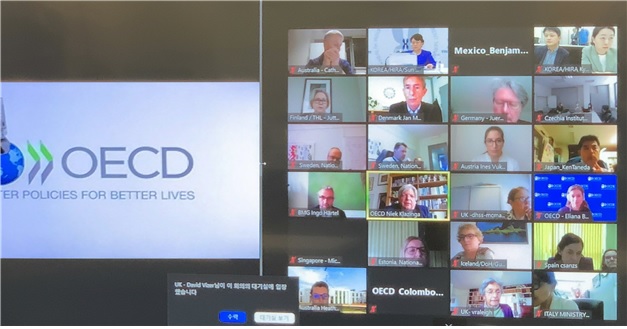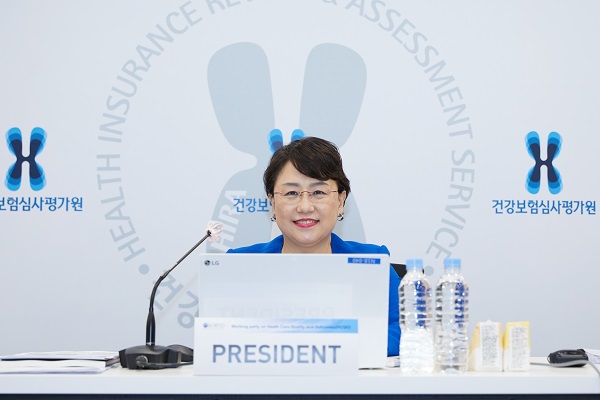Korea has presented the nation’s performances thus far in dealing with the new coronavirus pandemic, sharing its experiences with other OECD nations and introducing its system and know-how that has won global recognition to them.
On Tuesday, the Health Insurance Review and Assessment Service of Korea (HIRA), a state agency, held a video conference of the OECD’s Working Group on Healthcare Quality and Outcomes (HCQO). HCQO has been aiming to develop and report indicators using comparable data of health care quality across countries since its launch in 2001.
HIRA President Kim Sun-min chaired the meeting, sharing each nation's countermeasures on Covid-19 from the aspect of the healthcare system, and discussing ways to use the information in real-time.
Kim also introduced the excellence of the Korean healthcare information system in responding to Covid-19.
The Working Group on HCQO, considering the worldwide infection of Covid-19, has switched from the previous offline meeting to an online conference. The participants discussed the development of comparable healthcare quality indicators, focusing on the information structure, patient safety, and the possibility of integrated treatment management related to the new coronavirus pandemic.

About 90 experts from 33 nations and international organizations, including Korea, the United Kingdom, France, Japan, and Canada, World Health Organization, International Society for Quality in Health Care (ISQua) and European Commission (EC), attended the meeting.
Attendees used discussions, chats, and surveys to exchange each country’s Covid-19 experiences.
The meeting proceeded in two sessions -- an overview of HCQO original workstreams followed by health system readiness and COVID-19 response.
In the first session, Dr. Katherine de Bienassis of OECD Secretariat presented the HCQO's work on people-centered health services, performance of integrated care delivery system, patient-reported indicators survey (PaRIS), expanding the patient safety measurement system, quality indicators for end of life care, and process and updates for the HCQO 2020-2021 data collection.
The second session covered how health system readiness and emergency preparedness corresponds to HCQO's agenda. Dr. Niek Klazinga from the OECD Secretariat showed the HCQO's work on Covid-19 that notes the significance of prepared health systems and data networks for patient safety.
Emergency management is divided into four stages -- preparedness, response, mitigation, and recovery. Many countries have passed the peak of the pandemic, and they should have prepared their health systems to be able to face the transition period to recovery. Covid-19 challenges for excellent, safe, and coordinated care for Covid-19 and patients with other illnesses. The transition stage will require the health system to be ready to deliver urgent care for Covid-19 patients and healthcare for non-Covid-19 patients who need treatment, vaccine, and care service.

Chairperson Kim explained the excellence in Korea’s healthcare systems concerning real-time use of information request and medical resource information, including international traveler information system, management system for patient history, sickbed monitoring system on negative pressure room, and mask purchase history confirmation system.
The delegates discussed issues related to Covid-19, such as information structures that can link data in real-time, protective equipment management for medical personnel, and patient management outside hospitals.
"The meeting was valuable as we shared the present status of healthcare systems in OECD members and discussed the direction of healthcare quality management after Covid-19 ends," Kim said. "HIRA will continue to share its experience with the international community and actively cooperate in improving healthcare quality."

